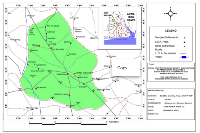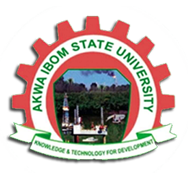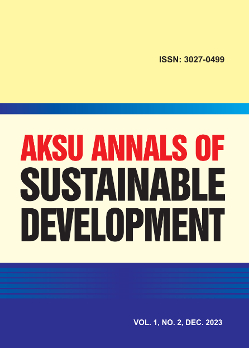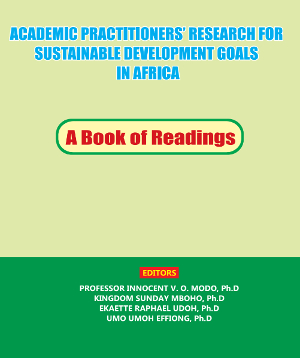SOCIAL CONSTRUCTIONS AND IDENTITY MANIPULATIONS OF PERSONS WITH DISABILITIES IN IKOT EKPENE LOCAL GOVERNMENT AREA, AKWA IBOM STATE, NIGERIA
https://doi.org/10.60787/AASD-1-2-10
Keywords:
Social Constructions, Identity manipulations, Persons with Disabilities, Ikot Ekpene Local Government AreaAbstract
This paper presents an examination of the social constructions and identity manipulations of persons with disabilities in rural communities within Ikot Ekpene Local Government Area, Akwa Ibom State, Nigeria. Phenomenology was adopted as a theoretical guide to properly situate the implications of social constructions of disability and identity manipulations of persons with disabilities in contemporary rural communities within the framework of the study. The study was limited to five (5) selected rural communities in Ikot Ekpene Local Government Area (Utu Edem Usung, Uruk Uso, Abiakpo Ikot Essien, Mbiaso, and Ikot Abia Idem). The sample size was 80 participants who were persons with differet forms of disabilities and have been subjected to a series of inhumane treatments in the study area. The survey method with Rapid Individual Unstructured Interview (RIUI) and Focus Group Discussion (FGD) had been adopted and used. The data were analyzed using the qualitative approach. The results showed that persons with disabilities are being discriminated against more than persons without disabilities. The results also revealed significant research gaps and a lack of information that is easily accessible to the public. The core of this study is that a cost-effective strategy is needed to reach persons with disabilities in their communities. This approach makes use of existing community services and promotes inclusion rather than exclusion.
Downloads
References
Akwa Ibom State Government (2011). Ikot Ekpene Local Government Area: Local Economic Empowerment Strategy [LEEDS] (2008-2011). Ministry of Local Government and Chieftaincy Affairs, Uyo.
Bonk, C. J. & Graham, C. R. (in press). Handbook of blended learning: global Perspectives, local designs. San Francisco, CA: Pfeiffer Publishing. https://curtbonk.com/graham_intro.pdf
Campbell, J. M. & Park, J. (2017). Extending the resource-based view: effects of strategic orientation toward community on small business performance. Journal of Retailing and Consumer Services, 34, 302-308.
Collier, L. (2017). Seeking intimacy: people with physical disabilities fight hurtful stereotypes when looking for relationship partners. American Psychological Association, 48(11), 48.
Dimmick, B. & Aksoz, A. M. (2022). Voting with a disability: Breaking down barriers to the ballot. ACLU, News and Commentary.
Retrieved from https://www.aclu.org/news/voting-rights/voting-with-a-disability.
Drew, C. (2023). Social construction of disability: definitions & 10 examples. Helpful Professor.
Dudley-Marling, C. (2016). The social construction of learning disabilities. Journal of LearningDisabilities, 37(6), 482-489.
Effiong, U., Ekanem, A. & Ottong, I. (2023). Inclusive education and sustainable learning opportunities for persons with disabilities in Akwa Ibom State University, Obio Akpa Campus, Nigeria. In: Innocent V. O. Modo, Kingdom S. Mboho, Ekaette R. Udoh & Umo U. Effiong (Eds). Academic Practitioners‟ Research for Sustainable Development Goals in Africa. ICIDR Publishing House: Ikot Ekpene.
Effiong U. U., Kingdom, M. & Wordu, S.(2018). Post-civil war experience and women with disabilities in Nigeria. Journal of Research in Education and Society, 9(2), 105–126.
Effiong, U. & Ekpenyong, O. (2017a). Community based rehabilitation services and livelihood enhancement for persons with disabilities in Nigeria: a case study of Akwa Ibom State. Journal of Sociology, Psychology and Anthropology in Practice, 8(1), 62 – 67.
Effiong, U. & Ekpenyong, O. (2017b). Effect of community based rehabilitation services and livelihood enhancement among people with disabilities in Akwa Ibom State, Nigeria. International Journal of Economic Development Research and Investment, 8(1), 15 – 30.
Effiong, U. & Agha, E. O.(2020). Rehabilitation interventions and non-medical use of Prescription among persons with psycho-social disabilities in Nigeria. Perspectives on Drugs, Alcohol and Society in Africa, 5(1),92-108.
Effiong U., Udousung, I. and Udoh, E.(2018). Herdsmen/farmers crisis and rehabilitation of victims: a study of Middle Belt-Nigeria. Uyo Journal of Sustainable Development, 3(2), 163-169.
Effiong, U. U. (2019). Gender and healthcare inequalities amongst rural women with disabilities in Ikot Ekpene Local Government Area of Akwa Ibom State, Nigeria. Akwapoly Journal of Communication and Scientific Research, 4(1), 88-103
Eide, A., and Ingstad, B. (2011). Disability and poverty: a global challenge. Bristol: University Press. https://policy.bristoluniversitypress.co.uk/disability-and-poverty.
Ekong, D. (2023).The Map of Ikot Ekpene Local Government Area, Akwa Ibom State, Nigeria. Forber-Pratt, A.J. & Zape, M.P. (in press). Disability identity development model: Voices from the ADA-generation, Disability and Health Journal. Advanced Online Publication.
Available from:https://www.researchgate.net/publication/312048976_Disability_Identity_Development_Model_Voices_from_the_ADA-Generation#fullTextFileContent [accessed Nov 03 2023].
Ghazala, M. (2008). Ethnicity and Inequalities in Health and Social Care A Race Equality Foundation Briefing Paper Better Health Briefing 2 Effective communication with service users. Available from:
Jones, S. (1996). Towards inclusivity: Disability as social construction. NASPA Journal, 33(4), 347-354.
Shakespeare, T. (2014). Disability rights and wrongs revisited. Routledge, Norwich. The African Child Policy Forum (2011). Educating children with disabilities in Africa: towards a policy of inclusion. The African child Policy Forum, Addis Ababa.
Mir, N., Rafig, A., Kumar, F., Singh & Shukla, V. (2017). Determinants of broiler chicken Meat quality and factors affecting them: a review. Journal of Food Science and Technology, 54(10), 2997–3009.
Molloy, H. & Vasil L. (2002). The social construction of asperger syndrome: the Pathologising difference? Disability and Society, 17(6), 659-669.
Oliver, M. (2013). The social model of disability: thirty years on. Disability and Society, 28(7), 1024-1026.
Vickers, N. (2008). Coleridge and the idea of „psychological‟ criticism. Journal for Eighteenth- Century Studies, 30(2), 261-278.
WHO (2014).World health statistics. GENEVA.https://www.who.int/news/item/15-05-2014-world-health-statistics-2014
Zhang, W., Bjørnstøl, P., Ding, P., Gao, W., Liu, H. & Liu, Y. (2024). Disability, sexuality, and gender in Asia: inter-sectionality, human rights and the law. Routledge, New York.

Downloads
Published
Issue
Section
License
Copyright (c) 2024 AKSU Annals of Sustainable Development

This work is licensed under a Creative Commons Attribution-NonCommercial-NoDerivatives 4.0 International License.
Manuscript content on this site is licensed under Creative Commons Licenses. Authors wishing to include figures, tables, or text passages that have already been published elsewhere are required to obtain permission from the copyright owner(s) for both the print and online format and to include evidence that such permission has been granted when submitting their papers. Any material received without such evidence will be assumed to originate from the authors.





 ICIDR Publishing House
ICIDR Publishing House